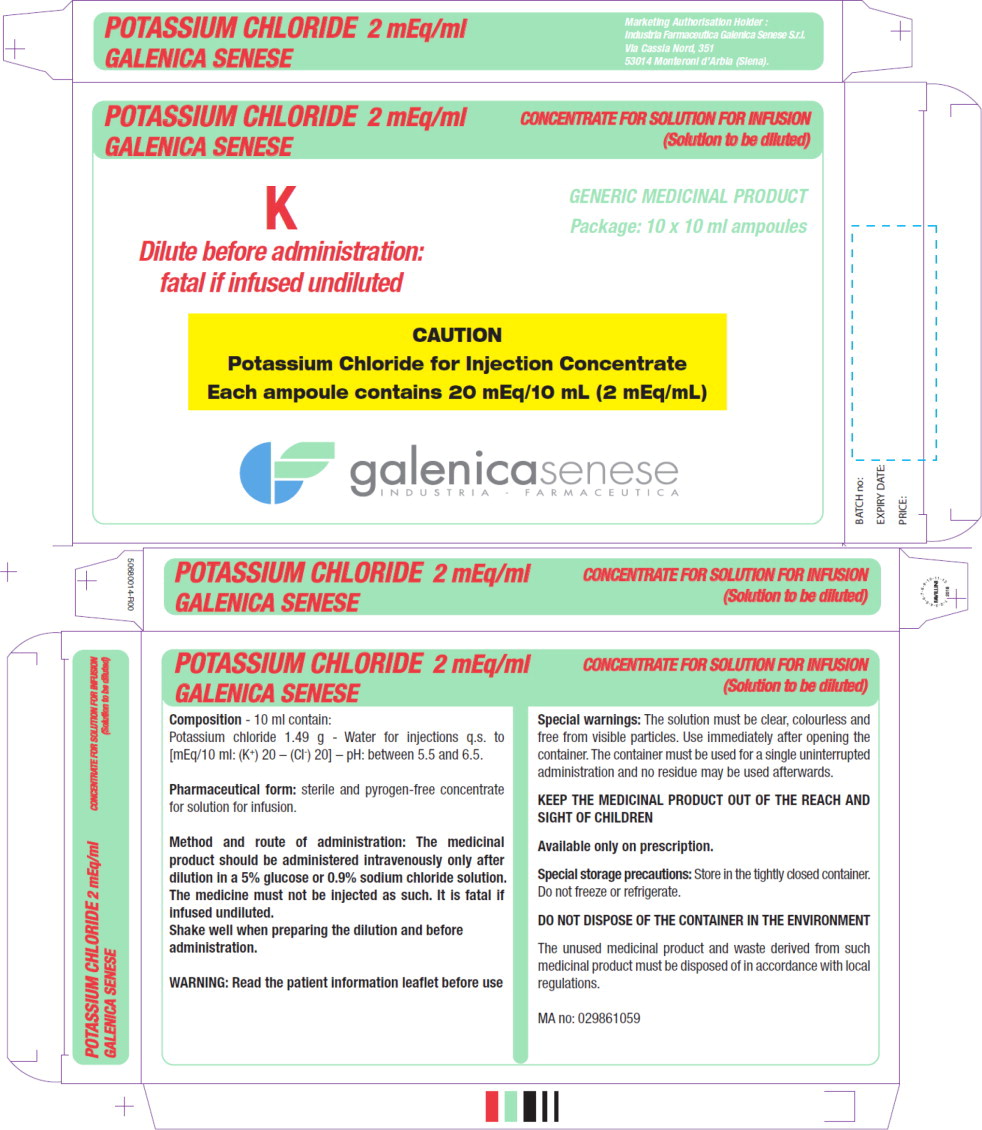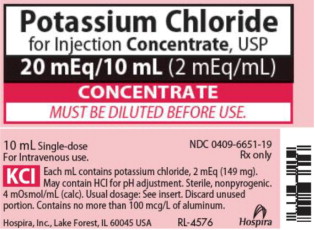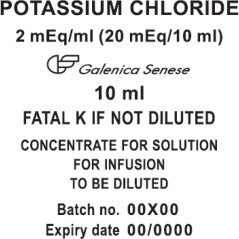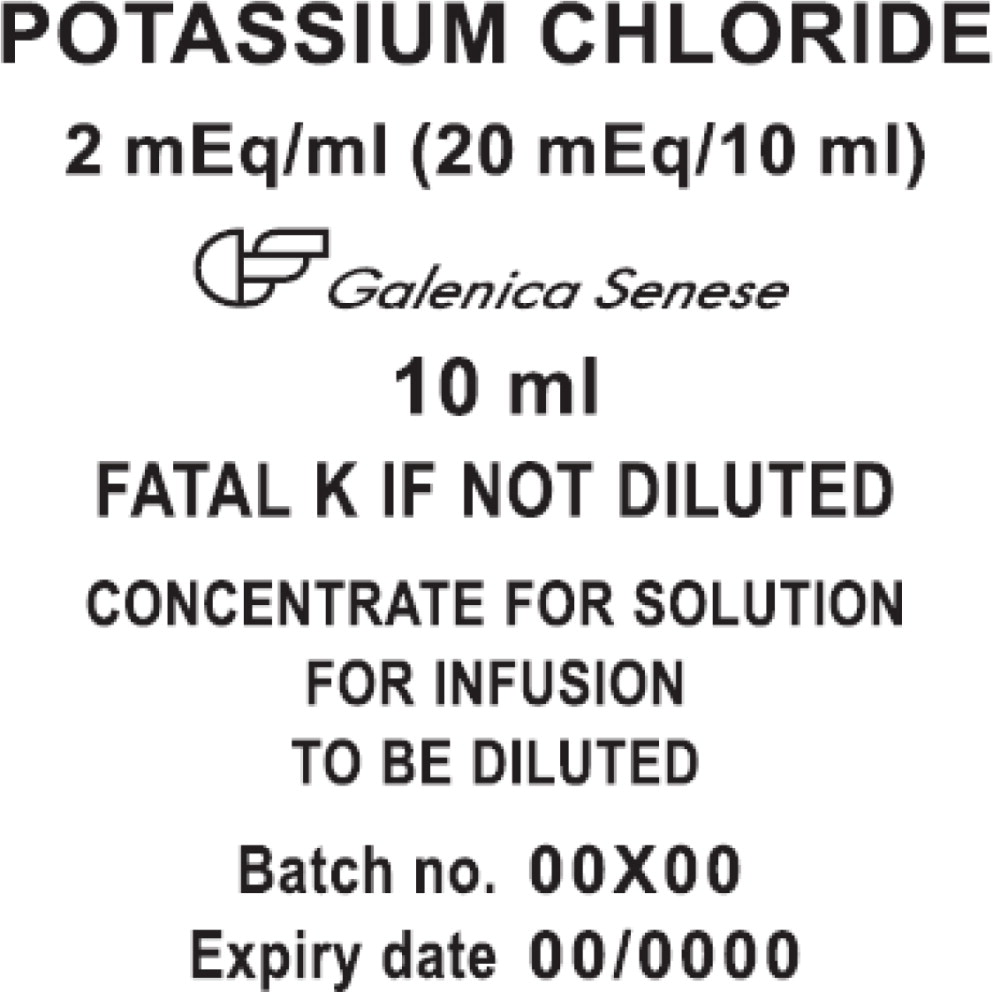POTASSIUM CHLORIDE injection, solution, concentrate
Potassium Chloride by
Drug Labeling and Warnings
Potassium Chloride by is a Prescription medication manufactured, distributed, or labeled by INDUSTRIA FARMACEUTICA GALENICA SENESE SRL. Drug facts, warnings, and ingredients follow.
Drug Details [pdf]
-
HEALTH CARE PROVIDER LETTER
Athenex
Important Prescribing Information
Subject: Temporary importation of Potassium Chloride (KCl) Injection, Concentrate, 2 mEq/mL to address drug shortage issues
July 11, 2018
Dear Healthcare Professional,
Due to the current critical shortage of Potassium Chloride for Injection, Concentrate, 2 mEq/mL in the United States (US) market, Athenex Pharmaceutical Division, LLC (Athenex) is coordinating with the U.S. Food and Drug Administration (FDA) to increase the availability of Potassium Chloride Injection Concentrate. Athenex has initiated temporary importation of another manufacturer's Potassium Chloride Injection Concentrate 2 mEq/mL into the U.S. market. This product is manufactured and marketed in Italy by Industria Farmaceutica Galenica Senese S.r.l. (Galenica).
Given the scale of this shortage, FDA is coordinating with several firms to import Potassium Chloride Injection 2 mEq/mL. At this time, however, no other entity except Athenex Pharmaceutical Division, LLC is authorized by the FDA to import or distribute Galenica's Potassium Chloride Injection Concentrate 2 mEq/mL ampule. FDA has not approved Galenica's Potassium Chloride Injection Concentrate 2 mEq/mL ampule but does not object to its importation into the United States. You may be provided with additional letters for other imported products you receive. Please read each letter in its entirety because each letter may contain different, product-specific information.
Effective immediately, and during this temporary period, Athenex will offer the following presentation of Potassium Chloride Injection Concentrate:
Product name and description Size Pack factor NDC Number Potassium Chloride Injection, Concentrate, 2 mEq/mL 10 mL 10 ampules per carton 72439-500-10 It is important to note the following:
- Each ampule contains potassium chloride 20 mEq/10 mL (2 mEq/mL). An image of the carton label is included in Table 1.
- Follow standard aseptic technique and withdraw contents of the ampule with a 5-micron filter needle. Change the needle before diluting in a solution for intravenous infusion.
- There is no barcode on the ampule or carton. Alternative procedures should be followed to assure that the correct drug product is being used.
Subject: Temporary importation of Potassium Chloride (KCl) Injection, Concentrate, 2 mEq/mL to address drug shortage issues -Page 2-
A side by side comparison of the Hospira PI and the Galencia patient leaflet is included in the Table 2 at the end of this letter.
Please refer to the package insert for the FDA-approved Potassium Chloride for Injection Concentrate, USP drug product for full prescribing information.
/DailyMed/559a0a8c-a8fe-40a5-b196-21f9308780ab&audience=consumer
To order or if you have questions about Galenica's KCl Injection 2 mEq/mL, 10 mL ampules, please contact Athenex's Customer Service by phone at 1-855-273-0154.
Order number: AA0681002
To report adverse events among patients who have received Galenica's KCl Injection, 2 mEq/mL, 10 mL ampules, please contact Athenex's Medical Affairs by phone at 1-855-273-0154. Adverse events may also be reported to FDA's MedWatch Adverse Reporting Program either online, by regular mail or fax:
- Complete and submit the report Online: www.fda.gov/medwatch/report.htm
- Regular Mail or Fax: Download form www.fda.gov/MedWatch/getforms.htm or call 1-800-332-1088 to request a reporting form, then complete and return to the address on the pre-addressed form, or submit by fax to 1-800-FDA-0178 (1-800-332-0178)
If you have any questions about the information contained in this letter or use of Galenica's KCl Injection 2 mEq/mL 10 mL ampules, please contact Athenex's Medical Affairs at 1-855-273-0154.
Sincerely,
Thomas J. Moutvic
Vice President, Regulatory Affairs
Athenex Pharmaceutical Division, LLCTABLE 1
Principal Display Panel of Carton Labeling
TABLE 2
Product Comparison Table
TABLE 2
Page -2US Approved Product
HospiraImported Product
GalenicaWarnings (Cont'd) The administration of intravenous solutions can cause fluid and/or solute overload resulting in dilution of serum electrolyte concentrations, overhydration, congested states or pulmonary edema.
The risk of dilutional states is inversely proportional to the electrolyte concentration. The risk of solute overload causing congested states with peripheral and pulmonary edema is directly proportional to the electrolyte concentration.
WARNING: This product contains aluminum that may be toxic. Aluminum may reach toxic levels with prolonged parenteral administration if kidney function is impaired. Premature neonates are particularly at risk because their kidneys are immature, and they require large amounts of calcium and phosphate solutions, which contain aluminum.
Research indicates that patients with impaired kidney function, including premature neonates, who receive parenteral levels of aluminum at greater than 4 to 5 mcg/kg/day accumulate aluminum at levels associated with central nervous system and bone toxicity. Tissue loading may occur at even lower rates of administration.Pregnancy and lactation
Ask your doctor or pharmacist for advice before taking any medicine.
No data are available on possible adverse effects of the medicinal product when administered during pregnancy or lactation or on reproductive capacity.
Therefore, the medicinal product should not be used during pregnancy and lactation, unless absolutely necessary and only after a risk-benefit assessment has been carried out.
Effects on ability to drive and use machines
The medicinal product does not impair the ability to drive or use machinery.Precautions General
Clinical evaluation and periodic laboratory determinations are necessary to monitor changes in fluid balance, electrolyte concentrations, and acid-base balance during prolonged parenteral therapy or whenever the condition of the patient warrants such evaluation. Significant deviations from normal concentrations may require the use of additional electrolyte supplements, or the use of electrolyte-free dextrose solutions to which individualized electrolyte supplements may be added.High plasma concentrations of potassium can cause death from cardiac depression, arrhythmias or arrest. To avoid potassium poisoning, infusion should be slow.
Administration should be guided through serrated electrocardiograms; potassiemia is not indicative of cellular potassium concentrations. It is good practice to monitor fluid balance, electrolytes and acid-base balance during infusion.TABLE 2
Page -3
US Approved Product
HospiraImported Product
GalenicaPrecautions (Cont'd) Potassium therapy should be guided primarily by serial electrocardiograms, especially in patients receiving digitalis. Serum potassium levels are not necessarily indicative of tissue potassium levels.
Solutions containing potassium should be used with caution in the presence of cardiac disease, particularly in the presence of renal disease, and in such instances, cardiac monitoring is recommended.
Solutions containing dextrose should be used with caution in patients with overt or known subclinical diabetes mellitus, or carbohydrate intolerance for any reason.
If the administration is controlled by a pumping device, care must be taken to discontinue pumping action before the container runs dry or air embolism may result.
Pregnancy
Teratogenic Effects: Pregnancy category C. Animal reproduction studies have not been conducted with potassium chloride. It is also not known whether potassium chloride can cause fetal harm when administered to a pregnant woman or can affect reproduction capacity. Potassium chloride should be given to a pregnant woman only if clearly needed.The medicine should be administered with caution to patients:
- with renal failure (administration of solutions containing potassium ions in patients with decreased renal function may cause potassium retention);
- with heart failure, especially if digitized;
- with adrenal insufficiency;
- with liver failure;
- with periodic family paralysis;
- with congenital myotonia;
- in the early post-operative phases.Adverse Reactions Reactions which may occur because of the solution or the technique of administration include febrile response, infection at the site of injection, venous thrombosis or phlebitis extending from the site of injection, extravasation, hypervolemia, and hyperkalemia.
Too rapid infusion of hypertonic solutions may cause local pain and, rarely, vein irritation. Rate of administration should be adjusted according to tolerance.
Like all medicines, Potassium Chloride can cause side effects although not everyone gets them.
The following are the side effects of Potassium Chloride. There are insufficient data available to determine the frequency of the individual listed effects.
Gastrointestinal disorders
Gastrointestinal disorders.TABLE 2
Page -4
US Approved Product
HospiraImported Product
GalenicaAdverse Reactions (Cont'd) Reactions reported with the use of potassium-containing solutions include nausea, vomiting, abdominal pain and diarrhea. The signs and symptoms of potassium intoxication include paresthesias of the extremities, areflexia, muscular or respiratory paralysis, mental confusion, weakness, hypotension, cardiac arrhythmias, heart block, electrocardiographic abnormalities and cardiac arrest. Potassium deficits result in disruption of neuromuscular function, and intestinal ileus and dilatation.
If an adverse reaction does occur, discontinue the infusion, evaluate the patient, institute appropriate therapeutic countermeasures and save the remainder of the fluid for examination if deemed necessary.Nervous system disorders
Neuromuscular disorders, paresthesias, flaccid paralysis, weakness, mental confusion.
Cardiac diseases
Hypotension, arrhythmias, conduction disturbances, disappearance of the P wave, enlargement of the QRS in the electrocardiographic trace, cardiac arrest.
Disorders of the water and electrolytic balance
Hypervolemia.
Systemic disorders and conditions related to the site of administration
Febrile responses, infections in the injection site, venous or phlebitis thrombosis, extravasation.
Adherence to the instructions in the package insert reduces the risk of side effects.
If any of the side effects get serious, or if you notice any side effects not listed in this package leaflet, please tell your doctor or pharmacist.Over dosage In the event of fluid overload during parenteral therapy, re-evaluate the patient's condition, and institute appropriate corrective treatment.
In the event of over dosage with potassium-containing solutions, discontinue the infusion immediately, and institute corrective therapy to reduce serum potassium levels.
Treatment of hyperkalemia includes the following:
1. Dextrose Injection USP, 10% or 25%, containing 10 units of crystalline insulin per 20 grams of dextrose administered intravenously, at a rate of 300 to 500 mL per hour.In case of overdose, immediately suspend infusion of the solution containing potassium and institute corrective therapy to reduce elevated plasma potassium levels and restore, if necessary, the acid-base balance (see Precautions for Use).
In case of accidental ingestion/undertake of an excessive dose of Potassium Chloride inform your doctor immediately or contact the nearest hospital.TABLE 2
Page -5US Approved Product
HospiraImported Product
GalenicaOver dosage (Cont'd) 2. Absorption and exchange of potassium using sodium or ammonium cycle cation exchange resin, orally and as retention enema.
3. Hemodialysis and peritoneal dialysis. The use of potassium-containing foods or medications must be eliminated. However, in cases of digitalization, too rapid a lowering of plasma potassium concentration can cause digitalis toxicity.If you are in any doubt about the use of Potassium Chloride, ask your doctor or pharmacist. Dosage and Administration Potassium Chloride for Injection Concentrate, USP must be diluted before administration. Care must be taken to ensure there is complete mixing of the potassium chloride with the large volume fluid, particularly if soft or bag type containers are used.
The dose and rate of administration are dependent upon the specific condition of each patient.
Dextrose Injection USP, 10% or 25%, containing 10 units of crystalline insulin per 20 grams of dextrose administered intravenously, at a rate of 300 to 500 mL per hour.
Absorption and exchange of potassium using sodium or ammonium cycle cation exchange resin, orally and as retention enema. Hemodialysis and peritoneal dialysis. The use of potassium-containing foods or medications must be eliminated. However, in cases of digitalization, too rapid a lowering of plasma potassium concentration can cause digitalis toxicity.
If the serum potassium level is greater than 2.5 mEq/liter, potassium can be given at a rate not to exceed 10 mEq/hour in a concentration of up to 40 mEq/liter. The 24-hour total dose should not exceed 200 mEq.
The medicinal product shall not be injected as such. Fatal if swallowed undiluted (see Precautions for Use). The medicinal product should be administered intravenously only after dilution in 5% glucose solution or 0.9% sodium chloride solution (saline solution) or other compatible solutions (see end of this section).
Shake well during dilution preparation and before administration.
The dose depends on the age, weight and clinical condition of the patient, taking into account that the normal daily requirement of potassium is as follows
Adults: 40-80 mEq per day. The total dose shall not exceed 200 mEq per day.
Children: 2-3 mEq/kg per day.
In children the safety and efficacy of potassium chloride have not been determined.
The medicine should only be administered with intact renal function and at a rate not exceeding 10 mEq potassium/hour.
Under emergency conditions (potassium values less than or equal to 2 mEq/l with electrocardiographic modifications and muscular paralysis) do not exceed the infusion rate of 40 mEq/hour, under electrocardiographic monitoring and do not exceed the dose of 400 mEq in 24 hours.
TABLE 2
Page -6Dosage and Administration
(Continued)If urgent treatment is indicated (serum potassium level less than 2.0 mEq/liter with electrocardiographic changes and/or muscle paralysis) potassium chloride may be infused very cautiously at a rate of up to 40 mEq/hour.
In such cases, continuous cardiac monitoring is essential. As much as 400 mEq may be administered in a 24-hour period. In critical conditions, potassium chloride may be administered in saline (unless contraindicated), rather than in dextrose containing fluids, as dextrose may lower serum potassium levels.
Prior to entering vial, remove the metal seal and cleanse the rubber closure with a suitable antiseptic agent.
Parenteral drug products should be inspected visually for particulate matter and discoloration, whenever solution and container permit.
TO PREVENT NEEDLE-STICK INJURIES, NEEDLES SHOULD NOT BE RECAPPED, PURPOSELY BENT, OR BROKEN BY HAND.Infusions that are too rapid can cause local pain and the infusion rate must be adjusted for tolerance.
Solutions to be used for the dilution of potassium chloride
See dose, manner, and time of administration.
Dilute the solution immediately after opening the container; the diluted solution must be used immediately. It must be clear, colorless and free of visible particles. It serves for a single and uninterrupted administration and any residue cannot be used.
Shake well during dilution preparation and before administration. Do not use if the solution is not clear, colorless, or contains particles.
All usual precautions should be taken to maintain sterility before and during intravenous infusion.Storage Store at 20 to 25°C (68 to 77°F). [See USP Controlled Room Temperature.] Deadline: See expiration date on package.
The expiry date refers to the product in intact packaging, correctly stored.
Warning: Do not use the medicine after the expiry date shown on the packaging.
Storage conditions
Store in the original container and in the hermetically sealed container. Do not refrigerate or freeze.
Medicines must not be disposed of in waste water or household waste. Ask your pharmacist how to dispose of medicines that you no longer use. This will help to protect the environment.
Keep the medicine out of the reach and sight of children.TABLE 2
Page -7US Approved Product
HospiraImported Product
GalenicaAdditional Sections: Clinical Pharmacology Potassium is the chief cation of body cells (160 mEq/liter of intracellular water) and is concerned with the maintenance of body fluid composition and electrolyte balance. Potassium participates in carbohydrate utilization and protein synthesis and is critical in the regulation of nerve conduction and muscle contraction, particularly in the heart. Chloride, the major extracellular anion, closely follows the metabolism of sodium, and changes in the acid-base balance of the body are reflected by changes in the chloride concentration.
Normally about 80 to 90% of the potassium intake is excreted in the urine, the remainder in the stools and, to a small extent, in perspiration. The kidney does not conserve potassium well so that during fasting, or in patients on a potassium-free diet, potassium loss from the body continues, resulting in potassium depletion. A deficiency of either potassium or chloride will lead to a deficit of the other.Section not in Galenica PI Interactions Section not in Hospira PI Inform your doctor or pharmacist if you have recently taken any other medicines, including medicines obtained without a prescription.
The use of drugs such as potassium-sparing diuretics may increase the risk of hyperkalemia, particularly in the presence of renal dysfunction. Therefore, serum potassium levels should be closely monitored in such cases.
The use of drugs such as ACE inhibitors that cause aldosterone levels to decrease, may lead to potassium retention. Therefore, serum potassium levels should be closely monitored.
-End of Table-
-
SPL UNCLASSIFIED SECTION
Galenica Senese Potassium chloride 2 mEq/ml concentrate for solution for infusion
Galenica Senese Potassium chloride 3 mEq/ml concentrate for solution for infusionPHARMACO-THERAPEUTIC GROUP
Electrolytic solutions.
THERAPEUTIC INDICATIONS
Treatment of potassium deficiencies in patients for whom oral reintegration is not possible.
- CONTRAINDICATIONS
-
PRECAUTIONS FOR USE
High blood concentrations of potassium can cause death from heart failure, arrhythmias or arrest. To avoid potassium poisoning, the infusion must be slow.
Administration should be guided through serial electrocardiograms; serum potassium levels are not indicative of potassium cell concentrations. It is good practice to monitor the fluid, electrolytes and acid-base balance during the infusion.
The medicinal product should be administered with caution in patients:
- - with renal insufficiency (administration of solutions containing potassium ions in patients with decreased renal function may cause potassium retention);
- - with heart failure, particularly if digitalised;
- - with adrenal insufficiency;
- - with hepatic failure;
- - with hypokalemic periodic paralysis;
- - with congenital myotonia;
- - in the early post-operative phases.
-
INTERACTIONS
Tell your doctor or pharmacist if you have recently taken any other medicinal product, including medicines obtained without a prescription.
The use of drugs such as potassium-sparing diuretics may increase the risk of hyperkalaemia, particularly in the presence of renal dysfunction. Therefore, in such cases serum potassium levels must be monitored closely.
The use of medicinal products such as ACE inhibitors that cause a decrease in aldosterone levels can lead to potassium retention. Therefore, serum potassium levels must be monitored closely.
-
SPECIAL WARNINGS
The solution must be clear, colourless and free from visible particles. Use immediately after opening the container. The container must be used for a single uninterrupted administration and no residue may be used afterwards.
Pregnancy and breastfeeding
Ask your doctor or pharmacist for advice before taking any medicine.
There are no data on possible adverse effects of the medicinal product when administered during pregnancy or breastfeeding or concerning the reproductive capacity.
Therefore, the medicinal product must not be used during pregnancy and breastfeeding unless clearly necessary and only after assessing the risk/benefit ratio.
Effects on ability to drive and use machines
The medicine does not affect the ability to drive or use machines.
-
POSOLOGY AND METHOD OF ADMINISTRATION
The medicine must not be injected as such. It is fatal if infused undiluted (see Precautions for use).
The medicinal product should be administered intravenously only after dilution in a 5% glucose or 0.9% sodium chloride solution (saline solution) or other compatible solutions (see end of this section).
Shake well when preparing the dilution and before administration.
The dose depends on the patient's age, weight and clinical condition, taking into account that the ordinary daily potassium requirement is as follows
Adults: 40-80 mEq per day. The total dose must not exceed 200 mEq per day.
Children: 2-3 mEq/kg per day.
The safety and efficacy parameters of potassium chloride have not been determined in children.
The medicinal product must only be administered with an intact renal function and at a rate not exceeding 10 mEq potassium/hour.
Under urgent conditions (potassium values less than or equal to 2 mEq/l with electrocardiographic changes and muscular paralysis) do not exceed the infusion rate of 40 mEq/h, under electrocardiographic monitoring and do not exceed the dose of 400 mEq in 24 hours.
Too fast infusions can cause local pain and the infusion rate should be adjusted in relation to tolerance.
Incompatibility with Galenica Senese Potassium chloride
Unless otherwise indicated, and with the exception of the solutions indicated below, it is not recommended to mix the potassium chloride solution with other medicinal products.
Solutions to be used for the dilution of Galenica Senese potassium chloride
See Posology and method of administration.
Dilute the solution immediately after opening the container; the diluted solution must be used immediately. This must be clear, colourless and free from visible particles. The container must be used for a single uninterrupted administration and no residue may be used afterwards.
Shake well when preparing the dilution and before administration. Do not use the medicine if the solution is not clear, colourless or should it contain particles.
Take all usual precautions to maintain everything sterile before and during the intravenous infusion.
-
OVERDOSE
In case of overdose, immediately stop the infusion of the potassium-containing solution and establish a corrective therapy to reduce the high plasma levels of potassium and to restore, if necessary, the acid-base balance (see Precautions for use).
In case of accidental ingestion/intake of an excessive dose of Galenica Senese Potassium Chloride, inform your doctor immediately or contact your nearest hospital.
Should you have any further questions or doubts on the use of Galenica Senese Potassium Chloride, contact your doctor or pharmacist.
-
ADVERSE EFFECTS
Like all medicinal products, Potassium Chloride can cause adverse effects, although not everybody has these.
The adverse effects of Potassium Chloride are listed below. There is insufficient data available to establish the frequency of the single effects listed.
Gastrointestinal diseases
Gastrointestinal disorders.
Nervous system diseases
Neuromuscular disorders, paraesthesia, flaccid paralysis, weakness, mental confusion.
Cardiac disorders
Hypotension, arrhythmias, conduction disturbances, P wave disappearance, QRS widening in the ECG trace, cardiac arrest.
Disorders of the water and electrolyte balance
Hypervolemia.
General disorders and administration site conditions
Febrile responses, infections at the injection site, venous thrombosis or phlebitis, extravasation.
Compliance with the instructions contained in the package leaflet reduces the risk of adverse effects.
Should any of the adverse effects worsen, or if you notice any adverse effect not listed in this leaflet, please tell your doctor or pharmacist.
-
EXPIRY DATE AND STORAGE
Expiry date: see the expiry date on the package.
The expiry date refers to the product in its intact packaging, correctly stored.
Warning: do not use after the expiry date shown on the package.
Storage conditions
Store in the original package and in the tightly closed container. Do not refrigerate or freeze.
Medicinal products should not be disposed of via wastewater or household waste. Ask the pharmacist how to dispose of the medicines you no longer use. This will help to protect the environment.
Keep the medicinal product out of the reach and sight of children.
-
COMPOSITION
Galenica Senese Potassium chloride 2 mEq/ml concentrate for solution for infusion
10 ml of solution contains:
Active substance: potassium chloride 1.49 g (each ml contains 2 mEq of K+ of Cl-) Excipients: Water for injections q.s. to 10 ml. pH: 5.5 - 6.5 Galenica Senese Potassium chloride 3 mEq/ml concentrate for solution for infusion
10 ml of solution contains:
Active substance: potassium chloride 2.24 g (each ml contains 3 mEq of K+ of Cl-) Excipients: Water for injections q.s. to 10 ml. pH: 5.5 - 6.5 - PHARMACEUTICAL FORM AND CONTENT
-
MARKETING AUTHORISATION HOLDER
Industria Farmaceutica Galenica Senese S.r.l.
MANUFACTURER
Industria Farmaceutica Galenica Senese S.r.l.
Review of the package leaflet by the Italian Medicines Agency: 20 February 2013
galenicasenese
I N D U S T R I A - F A R M A C E U T I C A
Via Cassia Nord, 351 - 53014 MONTERONI D'ARBIA (SI) - ITALY 076068001-R00
- PRINCIPAL DISPLAY PANEL
- PRINCIPAL DISPLAY PANEL
-
INGREDIENTS AND APPEARANCE
POTASSIUM CHLORIDE
potassium chloride injection, solution, concentrateProduct Information Product Type HUMAN PRESCRIPTION DRUG Item Code (Source) NDC: 72439-500 Route of Administration INTRAVENOUS Active Ingredient/Active Moiety Ingredient Name Basis of Strength Strength potassium chloride (UNII: 660YQ98I10) (POTASSIUM CATION - UNII:295O53K152, CHLORIDE ION - UNII:Q32ZN48698) potassium chloride 149 mg in 1 mL Inactive Ingredients Ingredient Name Strength water (UNII: 059QF0KO0R) Packaging # Item Code Package Description Marketing Start Date Marketing End Date 1 NDC: 72439-500-10 10 in 1 CARTON 07/13/2018 1 NDC: 72439-500-41 10 mL in 1 AMPULE; Type 0: Not a Combination Product Marketing Information Marketing Category Application Number or Monograph Citation Marketing Start Date Marketing End Date Unapproved drug for use in drug shortage 07/13/2018 Labeler - INDUSTRIA FARMACEUTICA GALENICA SENESE SRL (428829386)
© 2025 FDA.report
This site is not affiliated with or endorsed by the FDA.



